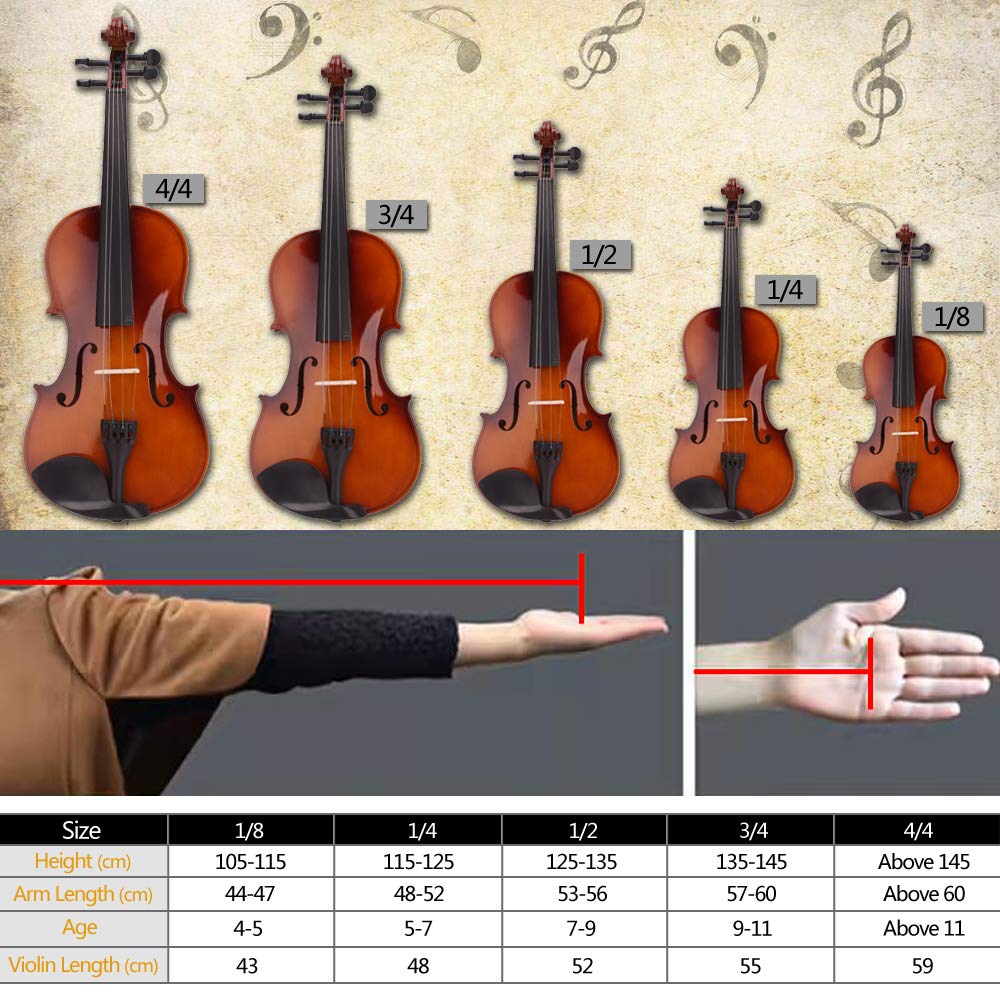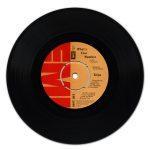Violin Size Chart – What Size Violin Do I Need?
Why is a violin’s size chart so crucial? Purchasing your initial violin is a thrilling experience. The anticipation of one’s first note or piece is the stuff of daydreams. Measuring the required violin size is straightforward. If you have not been notified of the size you need, this Violin sizing guide will assist you (skip straight to the Violin Size Chart).
Violins are available in eight different sizes. The size relates to the length of the violin’s body (not including the neck and scroll). The smallest size is 1/16 (only 9 inches or 23 cm), and the sizes advance from there to 1/10, 1/8, 1/4, 1/2, 3/4, 7/8, and finally 4/4 or full size (about 14 inches or 36 cm).
Violin essentials

Is the right violin size important?
A 1/4 violin is 47 centimeters long, and a 1/2 violin is just 4 centimeters longer, but this may make a significant difference to the player.
Playing on an improperly sized instrument might compel the musician to overextend or “scrunch up.” In any case, it will make learning to play much more difficult!
If you are an adult who is learning to play, you will most likely need a full-size instrument; nevertheless, you should confirm this information if you are doubtful about it. Please follow these easy measures for a youngster.
Jump right into the Frequently Asked Questions
Related: Crochet Hook Size Chart – A Handy Conversion Guide, Ansi Paper Size Chart – North America paper Sizes And Formats
Table of Content of Violin Sizing
- What Else Should You Consider When Choosing the Violin Size?
- Violin Size Chart
- How To Choose The Right Violin Size?
- Frequently Asked Questions
What Else Should You Consider When Choosing the Violin Size?
The degree of comfort that one experiences are the single most crucial factor to take into account. You or your student need to be able to play the violin with all four fingers while being comfortable. This is an essential skill.
Violin Size Chart
Related: Cornhole Board Size and dimensions guide, Pool Table Size Chart And Sizing: Dimensions by type and room, Piano Dimensions and size by type, Guitar Size Chart by Types of Guitars: what size do I need?
Before you go on, you must comprehend that this chart will have variations. This is only a guide. On the one hand, some more miniature adults use a 3/4 size violin. Alternatively, some young children have more extraordinary arm lengths. They would like to utilize the enormous instrument, making them more comfortable.
| Size | Age | Arms Length (Inches) | Arms Length (CM) |
| 1/16 | 3-5 | 14” | 35.56 |
| 1/10 | 4-5 | 15” | 38 |
| 1/8 | 4-6 | 16.5” | 42 |
| 1/4 | 5-7 | 18”-18.5” | 45.7-47 |
| 1/2 | 7-9 | 20” | 50.8 |
| 3/4 | 9-12 | 21.5”-22” | 54.6-56 |
| 7/8 | Small teen/adult | 22” and small hands | 56 and small hands |
| 4/4 or full size | 11 years to adult | 23” and larger hands | 58 and larger hands |
How do I know my Violin Size?
Determine the Student’s, Arm Span
Have the student stand with their left arm extended at a right angle from their shoulder, forming a 90-degree angle with their body. If noon is in front of them, their arms should be between 10 and 11 o’clock.
Ensure that their palm is facing up. They utilize a measuring tape or measuring stick. Take a measurement that is the distance from the center of the student’s palm to the student’s neck. Moreover, it is the most significant distance when determining what size violin to purchase. Write down the number.
Next, measure the distance between the student’s neck and the line at the wrist’s base. Write down the number. It is the standard length used to determine what size violin to purchase. Also, record this number. Utilize this tool to determine the appropriate violin size for you.
.jpg)
How To Choose The Right Violin Size?
Related: Knitting needle size chart by type of needle (including size conversion), Pickleball Court Size Dimensions by type in foot and meters, Roller Skate Size Chart for Adults and Children
In deciding where to buy your violin, how much money you are willing to spend, and what you will use that money for, you will also have to make sure that the item is the appropriate size.
If you didn’t already know, violins come in several sizes based on your age, size, and other factors, so it’s crucial that you decide which one is the best match for you. Violins are available in eight sizes. The dimensions correlate to the length of the violin’s body (not including the neck and scroll).
A violin is suitable if the left hand can easily reach the notes when held in the proper playing posture. You should also be able to comfortably wrap your left hand around the scroll’s curvature while maintaining a little bend in your arm.
Most people (and some youngsters as young as ten years old) will need a full-size violin. It depends on the length of your arm as well as how much weight you are able to bear without feeling uncomfortable. Additionally, while holding a violin, it should not feel cumbersome, and you should be able to grasp the top of the fingerboard with one hand while maintaining a flexible elbow. For instance, it is good for an adult to play a 7/8 violin, which is a bit smaller instrument than a full-sized violin, if they feel more comfortable doing this assignment on a 7/8 violin. Full-sized violins are more common.
Learn more about how to choose the right violin size (video)
Frequently Asked Questions
What is the best size violin for a beginner?
Violins are available in a variety of standard sizes, which are often expressed as fractions. These sizes range from 1/32 (which is suitable for youngsters) to 4/4 (which is sometimes referred to as full-size) and should be able to accommodate the majority of individuals. You may want to go for a 7/8 size if you’re not quite as tall as the average person or if you have smaller hands. However, having a professional fit you or having someone measure you is advisable.
What size violin do I need for my height?
The violin size chart approximates the average relationship between a players’ age (children mostly) and their arm’s length. We’ve also included information on the child’s height and the normal estimated parameters of instrument size to help with orientation. First, measure the left side of the player’s neck to the palm of their extended left arm, and then take another measurement from the player’s neck to their wrist. This will help you choose which size will fit the player the best. The component should be straight to the body and not bent at the elbow. The palm is pointing up towards the ceiling.

What size is a student’s violin?
To provide you with a point of reference, most young novice students (ages 4-6) begin their studies on either a 1/4 or a 1/8 size. However, the sizes do go much lower than that! By the time pupils are in middle school, most of them have progressed to a 3/4 size violin, and by the time they are in high school, they are typically playing a complete violin.
Conclusion
Getting the right size violin for your body is essential when purchasing a violin since it will make playing the instrument more comfortable for you than if you had gotten one that was either too large or too tiny for your frame. As a result, instead of concentrating on how uncomfortable you are, you should focus on mastering the correct technique for playing the violin. The violin size chart provided here may be useful to you when making your instrument choice.
The fact that tens of thousands of other students before have struggled with issues of sizing while learning to play such a well-known instrument as the violin is one of the many excellent benefits of learning to play the violin. In addition, the industry has had plenty of time to modify its goods to respond appropriately to those issues.
If you have questions, comment below.
Picture in this post is by Lucia Macendo on Unsplash
Related to Violin Size Chart
- O’Neill Wetsuit Size Charts
- Poker Chip Size Guide
- Baseball Card Size Guide
- Bocce Ball Court Size and Dimensions
- Pool Cue Length – Why it is Important?
- Helicopter Sizes and Different Types
- Chessboard Dimensions: What Is The Size Of It?
- Vinyl Record Size and Dimensions
- Ping-Pong Ball Size Chart
- Dolls Size: What Are the Different Sizes of Dolls?
- Bowling Ball Size and Dimensions
- What is the Size of a Playing Card?
- Basketball Size Guide
- Volleyball Size Chart
- Beer Pong Table Dimensions
- Tent Size Chart for Road, Wedding…
- Jet Ski Size: Which Size Should You Go For?
- Sailboat Size Guide for Beginners and PROs
- Rooftop Tent Size Chart
- Martial Arts Ring Sizes
- Portable Folding Chair Size for Camping, Sports…
- Mammut Sleeping Bag Sizes
- McKINLEY Sleeping Bags Sizes
























